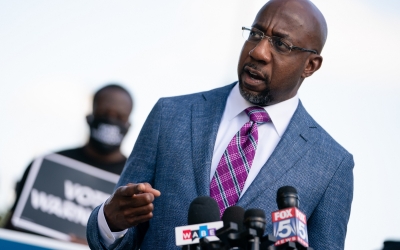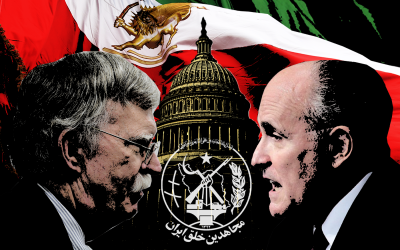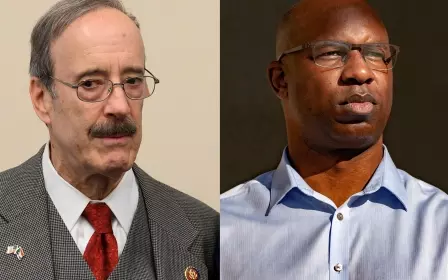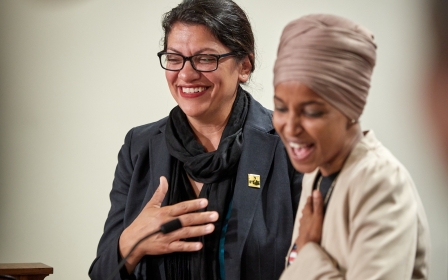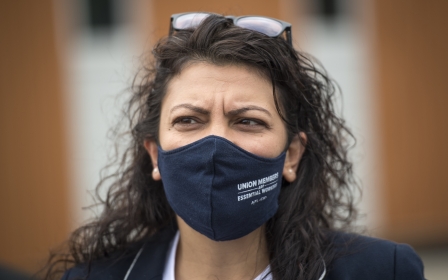Meet the Democrats vying for House foreign affairs leadership
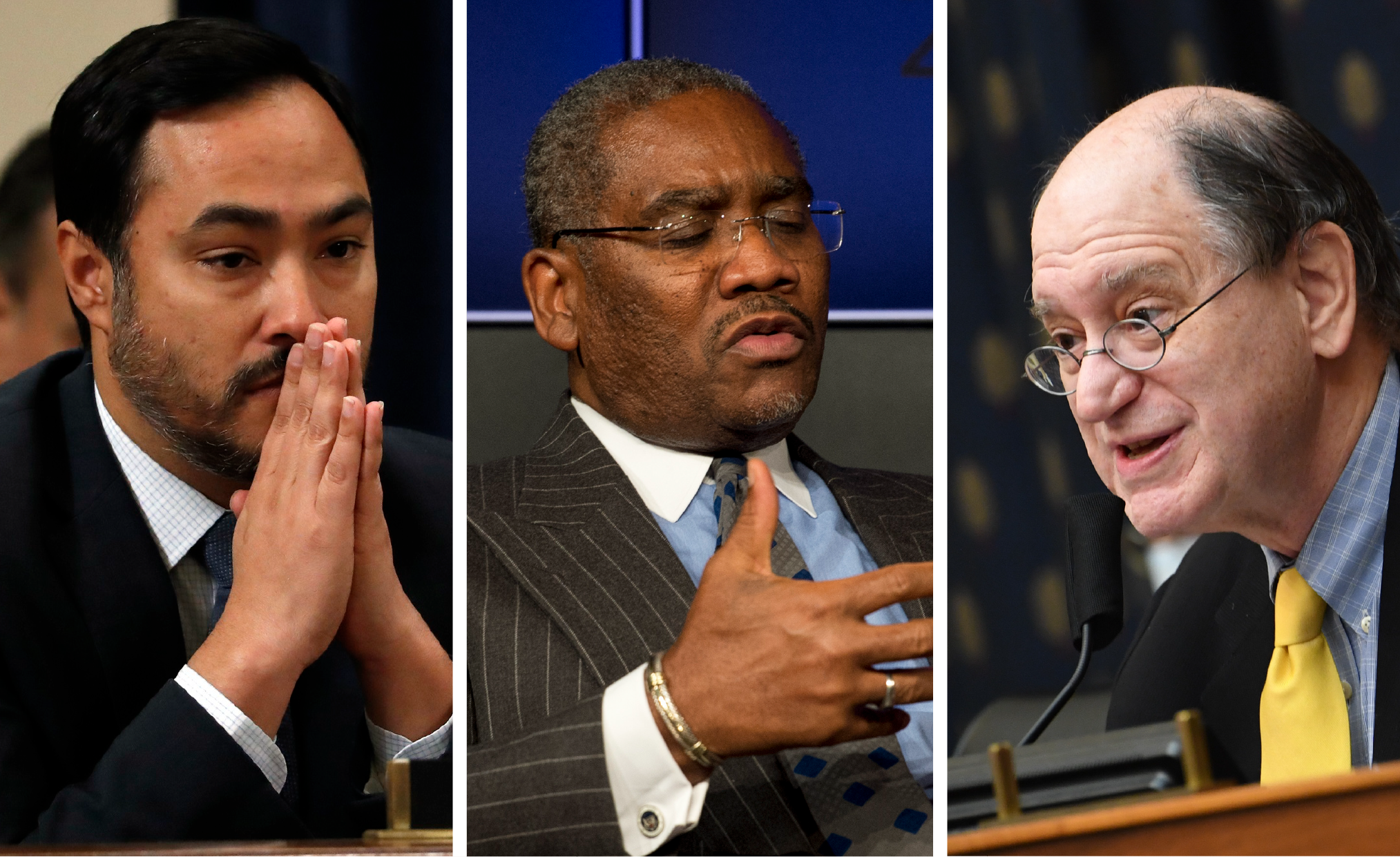
Eliot Engel, a Democratic Party elder, lost his seat in Congress to progressive challenger Jamaal Bowman in a primary contest that attracted national headlines earlier this year. Now, left-wing groups want Engel's gavel as the chair of the House Foreign Affairs Committee (HFAC) to also be passed on to a progressive lawmaker, and they're throwing their weight behind Congressman Joaquin Castro.
Fifty anti-war and progressive organisations penned a letter to the Democratic House leadership on Sunday urging that Castro succeed Engel as the chair of the HFAC, citing his advocacy for diplomacy, support for curbs on military spending and "recent commitment to include Palestinian voices in the formulation of policy impacting their lives".
"We believe Rep. Castro can protect our families and communities by promoting diplomacy and other nonviolent means - rooted in cooperation - to achieve US foreign policy objectives," the statement reads.
"As Black, indigenous, and other communities of color face increased militarism at home, and as U.S. militarism abroad has led to disastrous endless wars, we are impressed with Rep. Castro's transparent and engaging campaign for HFAC Chair, that focuses on the root causes of militarism."
The letter was organised by the Center for International Policy and signed by prominent progressive organisations, including Justice Democrats, Code Pink, IfNotNow and Justice for Muslims Collective.
New MEE newsletter: Jerusalem Dispatch
Sign up to get the latest insights and analysis on Israel-Palestine, alongside Turkey Unpacked and other MEE newsletters
Castro, who chairs the Congressional Hispanic Caucus, made a public pitch for the job earlier this year, pledging to work towards a diplomacy-driven US foreign policy, away from military interventions and "coercive tools like sanctions".
The HFAC chair yields immense powers, including holding up legislation, calling for hearings and ability to issue legally binding requests for information via congressional subpoena.
Castro, a 46-year-old Texas Democrat, faces competition from two more senior members of the committee for the gavel - Brad Sherman and Gregory Meeks.
The Democratic Steering and Policy Committee, a council led by Speaker Nancy Pelosi with representatives from all parts of the country, recommends committee chairs in the House.
The nominees then have to be approved by a majority of the Democratic Caucus before having their positions confirmed after new Congress convenes early next year.
Caucus bylaws specifically state that seniority is not the sole criterion for committee assignments.
Other "relevant factors" include "degree of commitment to the Democratic agenda, and the diversity of the Caucus, including appropriate representation of the Caucus’ ideological and regional diversity."
As Democrats gear up to pick the next chair by the end of the month, MEE takes a look at the Middle East record of all three candidates.
Joaquin Castro
When talking about the progressive wing of the Democratic Party in Congress, Castro's name may be far behind left-wing firebrands like Alexandria Ocasio-Cortez, Katie Porter and Ilhan Omar.
In fact, he does not rank among the most liberal members of Congress based on his voting record. But when it comes to foreign policy, Castro is proposing a break from Washington's usual approach that seldom gets debated in the halls of Congress.
"Wars of choice have diminished our moral standing, destabilized entire regions - as the Iraq War did to the Middle East - burdened our troops and their families, wasted limited resources, and killed innocent lives," Castro wrote in a blog post in July.
Elected to Congress in 2012, Castro has been a proponent of the Joint Comprehensive Plan of Action (JCPOA) - the multilateral deal that saw Iran scale back its nuclear programme in exchange of lifting sanctions against its economy.
"This agreement has the potential to position the United States and our allies toward a future of peace and security," Castro said in 2015. This position puts him more in line with President-elect Biden who was part of the Barack Obama administration that negotiated the agreement.
'Israeli settlements violate international law and their expansion is a serious impediment to peace'
- Joaquin Castro
Castro has also been outspoken against US support for the Saudi-led war in Yemen - a position he shares with most Democrats in the age of Donald Trump.
Where Castro appears to differ with the top brass of his party is his willingness to call out Israel.
"Israeli settlements violate international law and their expansion is a serious impediment to peace," Castro wrote in a tweet last month. "The Trump administration's decision to fund investments there breaks decades of bipartisan consensus, undermining America's ability to be a fair arbiter for a two-state solution."
Earlier this year, Castro told the Washington Post that he plans to elevate voices of Palestinians and other marginalised communities if chosen as chair.
"I think too often Palestinian voices have been excluded," he said. "If the United States is going to be an arbiter of peace, it has to be willing to hear from the different sides, and in my estimation, we’ve not always done that."
Castro, along with Meeks and Sherman, voted earlier this year in favour of a measure to cut US military spending by 10 percent. The amendment eventually failed to pass.
Brad Sherman
Brad Sherman, a 66-year-old lawmaker from California, is the most senior candidate. He also happens to be the most traditional. Sherman supported the US-led invasion of Iraq, stood firmly against Obama's Iran nuclear deal and encouraged moving the US embassy to Jerusalem.
The congressman was first elected to the House in 1996 and has rarely strayed away from the bipartisan consensus on hawkish foreign policy. In 2002, he called for passing the resolution authorising the war in Iraq with an "overwhelming margin".
In 2015, Sherman was one of 25 House Democrats who voted against the JCPOA. At the time, he called for congressional opposition to the Iran deal, arguing that legislative push back against Obama's executive decision would enable the next president to alter or nix the agreement.
"My job is to do all I can to prevent Americans from believing that this deal is morally binding on future administrations," Sherman said in a statement in 2015. "A substantial bipartisan vote against the deal will not tie this president’s hands, and it will give the future presidents the greatest possible freedom of action."
Which is exactly what happened. Trump did not consider the multilateral agreement to be "morally binding", and he withdrew from it in May 2018.
The Republican president then embarked on a "maximum pressure" campaign of sanctions against the Islamic Republic, spiking tensions that brought the two countries to the verge of war earlier this year.
Sherman was critical of Trump's decision to leave the agreement, arguing that the US administration should work with its allies to reimpose sanctions on Tehran over its involvement in Syria and Yemen, not the nuclear programme.
"If you're going to try to persuade people to sanction Iran, best to use the arguments that will work," he told NPR in 2018.
But even as he opposed Trump's approach on the Islamic Republic, Sherman continued to associate with the Iranian opposition group, Mujahideen-e Khalq (MEK), which seeks regime change in Tehran.
Critics dismiss the MEK, which had been designated as a terror group by Washington until 2012, as a "cult" with no representation in Iran.
Last year, Sherman attended a MEK rally in Washington and lauded Rajavi as an advocate for "democracy, women's rights and minority rights in Iran".
"Soleimani, this is the future of Iran; watch it on your video screen," Sherman said, addressing top Iranian general Qassem Soleimani, who would be killed by the Trump administration months after the demonstration in Washington.
The congressman is a staunch supporter of Israel and has often defended the Israeli leadership against criticism from his own party.
And in 2015, merely three years after the group's removal from the US terror list, Sherman spearheaded efforts to defend the decision to invite Maryam Rajavi to testify remotely at a congressional panel on counterterrorism.
'I attended the speech because Prime Minister Netanyahu embodies the Jewish state'
- Brad Sherman, 2015
Sherman, Castro and Meeks voted last year for a symbolic resolution denouncing the Palestinian-led Boycott, Divestment and Sanctions (BDS) movement.
But in 2017, the California congressman was the only one amongst the trio to co-sponsor a bill that would penalise Americans who boycott Israel.
When Israeli Prime Minister Benjamin Netanyahu addressed Congress in 2015 to undermine the JCPOA without an invitation from then-President Barack Obama, dozens of Democrats boycotted the speech, including Castro and Meeks.
Not Sherman. In fact, the California Democrat has been promoting his decision to attend and defend Netanyahu's controversial move, which was an insulting breach of diplomatic protocol against the former Democratic president.
"I attended the speech because Prime Minister Netanyahu embodies the Jewish state," Sherman said at a virtual event with the Democratic Majority for Israel earlier this year. "My two opponents in this race boycotted the prime minister’s speech."
Gregory Meeks
Gregory Meeks, a New York Democrat who is a senior member of the Congressional Black Caucus, is not as hawkish as Sherman. But he is not making the case for a progressive take on foreign policy like Castro.
Meeks voted against the Iraq war in 2002 and came out in support of the JCPOA in 2015 despite saying it's "not a perfect deal", and has been critical of Trump's unquestioning alliance with Saudi Arabia.
After a US air strike killed Soleimani in Baghdad in January, Meeks joined Democrats in questioning Trump's strategy or lack thereof towards Tehran.
"Iran is a dangerous regional actor and Soleimani was its military mastermind," Meeks said in a statement.
"Any action to strike him should have come with serious thought, strategy, and Congressional consultation. Instead, President Trump’s order to assassinate him is an escalation of hostilities that has no apparent strategy behind it."
The 67-year-old New Yorker has been a vocal supporter of Israel within the Democratic caucus. Earlier this year, he called for using American aid to Israel as leverage to prevent annexation, but he reversed his position weeks later.
"We know the extreme importance in the region to make sure that Israel has the right to defend itself - and the dollars that we give Israel to defend itself is absolute and unequivocal," Meeks told the American Jewish Committee at a virtual event in August.
After Israel and the United Arab Emirates announced establishing diplomatic relations in a deal brokered by Trump before the US elections, Meeks lauded the agreement calling it a "major milestone for the region".
"This announcement serves as reminder that diplomacy should be the forefront of U.S. policy in the Middle East. I look forward to working with both Israel and the UAE to advance peace and prosperity across both nations and throughout the region," he said in a statement.
Meeks angered progressives early in 2020 when he endorsed former New York Mayor Mike Bloomberg for president.
Bloomberg had been facing criticism over the city's surveillance programme against Muslims as well as the "stop and frisk" that targeted communities of colour.
Middle East Eye delivers independent and unrivalled coverage and analysis of the Middle East, North Africa and beyond. To learn more about republishing this content and the associated fees, please fill out this form. More about MEE can be found here.



